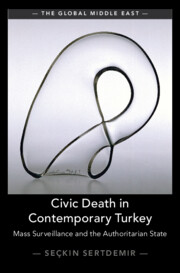Refine search
Actions for selected content:
61 results
Wha’s like us? The desecuritisation of migration as ontological security-seeking in Scotland
-
- Journal:
- Review of International Studies , First View
- Published online by Cambridge University Press:
- 07 November 2025, pp. 1-21
-
- Article
-
- You have access
- Open access
- HTML
- Export citation
The collective securitisation of climate change: Implications for climate adaptation policy in the United Nations and European Union
-
- Journal:
- Review of International Studies , First View
- Published online by Cambridge University Press:
- 16 September 2025, pp. 1-26
-
- Article
-
- You have access
- Open access
- HTML
- Export citation
Digital im/materiality and the securitisation of cyber
-
- Journal:
- European Journal of International Security , First View
- Published online by Cambridge University Press:
- 15 September 2025, pp. 1-20
-
- Article
-
- You have access
- Open access
- HTML
- Export citation
Gothic humanitarianism: Moving beyond the securitised approach to migration while embracing fear
-
- Journal:
- Review of International Studies / Volume 51 / Issue 5 / September 2025
- Published online by Cambridge University Press:
- 20 June 2025, pp. 839-859
- Print publication:
- September 2025
-
- Article
-
- You have access
- Open access
- HTML
- Export citation
Legal Structures of Tokenised Assets
-
- Journal:
- European Journal of Risk Regulation , First View
- Published online by Cambridge University Press:
- 15 May 2025, pp. 1-13
-
- Article
-
- You have access
- Open access
- HTML
- Export citation
Misplaced Priorities, Unnecessary Effects: Collective Suffering and Survival in Pandemic Philippines
-
- Journal:
- Asia-Pacific Journal / Volume 18 / Issue 15 / August 2020
- Published online by Cambridge University Press:
- 14 March 2025, e6
-
- Article
-
- You have access
- Open access
- Export citation
The European Union’s response to transnational repression: Are we moving towards securitisation?
-
- Journal:
- European Journal of International Security , First View
- Published online by Cambridge University Press:
- 14 March 2025, pp. 1-25
-
- Article
-
- You have access
- Open access
- HTML
- Export citation
2 - Punishment
-
- Book:
- Civic Death in Contemporary Turkey
- Published online:
- 09 January 2025
- Print publication:
- 23 January 2025, pp 61-84
-
- Chapter
- Export citation
3 - Control
-
- Book:
- Civic Death in Contemporary Turkey
- Published online:
- 09 January 2025
- Print publication:
- 23 January 2025, pp 85-111
-
- Chapter
- Export citation
5 - Biosecuritisation
-
- Book:
- Civic Death in Contemporary Turkey
- Published online:
- 09 January 2025
- Print publication:
- 23 January 2025, pp 137-158
-
- Chapter
- Export citation
Introduction
-
- Book:
- Civic Death in Contemporary Turkey
- Published online:
- 09 January 2025
- Print publication:
- 23 January 2025, pp 1-27
-
- Chapter
- Export citation
1 - Protection
-
- Book:
- Civic Death in Contemporary Turkey
- Published online:
- 09 January 2025
- Print publication:
- 23 January 2025, pp 28-60
-
- Chapter
- Export citation
Conclusion
-
- Book:
- Civic Death in Contemporary Turkey
- Published online:
- 09 January 2025
- Print publication:
- 23 January 2025, pp 159-172
-
- Chapter
- Export citation
Topos of threat and metapolitics in Russia’s securitisation of NATO post-Crimea
-
- Journal:
- Review of International Studies / Volume 51 / Issue 4 / July 2025
- Published online by Cambridge University Press:
- 13 January 2025, pp. 649-668
- Print publication:
- July 2025
-
- Article
-
- You have access
- Open access
- HTML
- Export citation

Civic Death in Contemporary Turkey
- Mass Surveillance and the Authoritarian State
-
- Published online:
- 09 January 2025
- Print publication:
- 23 January 2025
Routines die hard: Ontological security and audience agency in securitisation
-
- Journal:
- Review of International Studies , First View
- Published online by Cambridge University Press:
- 16 December 2024, pp. 1-26
-
- Article
-
- You have access
- Open access
- HTML
- Export citation
Emergency measures? Terrorism and climate change on the security agenda
-
- Journal:
- European Journal of International Security / Volume 10 / Issue 1 / February 2025
- Published online by Cambridge University Press:
- 19 November 2024, pp. 115-132
-
- Article
-
- You have access
- Open access
- HTML
- Export citation
A narrative approach to analysis of covert action
-
- Journal:
- Review of International Studies / Volume 51 / Issue 4 / July 2025
- Published online by Cambridge University Press:
- 23 September 2024, pp. 608-626
- Print publication:
- July 2025
-
- Article
- Export citation
2 - A Conceptual Framework for Understanding Energy Transitions
-
- Book:
- Energy Transitions in Central and Eastern Europe
- Published online:
- 19 April 2024
- Print publication:
- 04 April 2024, pp 36-48
-
- Chapter
- Export citation
8 - Conclusion
-
- Book:
- Energy Transitions in Central and Eastern Europe
- Published online:
- 19 April 2024
- Print publication:
- 04 April 2024, pp 168-176
-
- Chapter
- Export citation
